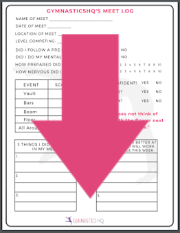
If you’re in the middle of meet season then you know how important scores are or at least how important you might think they are. In reality, while scores might seem like an indicator of your gymnastics success, they are actually one of the least valuable markers of how you’re doing in gymnastics. Not only can your scores vary from meet to meet, they can also vary based on the depth of competition at each meet. Therefore scores represent a part of gymnastics meets that gymnasts have very little control over.

If this is the case, then why are most gymnasts incredibly focused on their scores and on how well they place at meets? Most likely it’s because of the emphasis their coaches have put on scores and/or a byproduct of the general setup of a meet with scores being used as an indicator of placement. It’s not uncommon for a coach to dispute a score or tell parents that they feel a gymnast’s score did not reflect the excellence of her routine. While coaches have good intentions, this sort of reaction can lead gymnasts and parents to put unnecessary focus on scores. In addition, when a medal ceremony puts the spotlight on gymnasts who placed on the podium, it can also feel to gymnasts that scores really matter.
Don’t get us wrong. At some point at a higher level, scores are important. At the elite level, scores can separate gymnasts who make the National Team from those who don’t make the team or can lead a gymnast to earn an Olympic or World medal or cause them to lose one. Yet scores don’t share the same significance at lower levels of gymnastics. Since the majority of the gymnasts who compete in the Junior Olympic or Excel program will not become elite gymnasts, it’s better for these gymnasts to focus on things other than score to assess their progress.
While gymnasts can certainly track their scores from meet to meet, it’s easy for them to get sucked into using scores to determine how they feel about their meet and use their scores to assess how well they did. We’ve known of many gymnasts who felt good about their routines but left a meet disappointed by their scores. Sadly it’s this disappointment that they remember and not the things they did well at in their meets. This disappointment can lead a gymnast to a lack of motivation in practice or feelings of inadequacy in the gym. Unfortunately, this is NOT what we hope gymnasts will take away from gymnastics competitions.
Why Scores Don’t Matter
In reality, scores are only a small part of the equation of how successful a gymnast is and in many ways represent one of the least valuable indicators of success. The reason why is because scores are dependent on many factors, most of which are beyond a gymnast’s control. For example, while judges are trained on how to find deductions in gymnastics routines, it’s common that some judges might be more strict with their scoring than others. It’s also likely that judging can vary from state to state with some states being notorious for having stricter judges. Certain meets are also judged more stringently such as State and Regional meets. Thus, how nit picky the scoring is during a certain meet is something a gymnast cannot control.
Another reason why scores are not as important as most gymnasts think is because the judges’ ultimate goal at a meet is to rank gymnasts, something that many gymnasts and spectators don’t realize. Judging is a complex process where judges have to not only assess the gymnasts on the execution of their skills but also on how they compare to other gymnasts at that meet before assigning the gymnast a score. In addition, meet scores often tend to be lower in the beginning of a session in order to leave room for a gymnast who might come along later with an even better routine. While this might seem unfair, at the end of the meet the objective is to have gymnasts’ scores reflect how they compare to the other gymnasts at the meet. This ranking system might skew scores downward depending on the order in which gymnasts compete.
How well gymnasts score at a meet also depends on their competition. A gymnast’s scores will change depending on the field and depth of who she’s competing against. If a gymnast goes to a meet with other gymnasts who are very skilled at that level then her scores will be lower than if she was competing against a field of gymnasts who were less skilled. For example, some gymnasts use meets to test out of a certain level. These gymnasts may very well have the skills to compete at a higher level but need to score out of a lower level in order to officially move up. Obviously these gymnasts might perform better than a gymnast who is new to a level or still improving on her skills at that level and can drive the latter gymnast’s scores and placement down. As we said about the ranking system mentioned earlier, if a gymnast’s competition is strong, then she could find herself scoring lower at a meet.
With that being said, what should gymnasts focus on at gymnastics meets instead?
There are so many ways for a gymnast to determine her gymnastics success that don’t focus on score. Meets are a great way to track her progress and to see how much she is improving but they offer more value when the gymnast focuses on the process and not the product. For example, getting a 9.0 on vault is the product. It is the score a gymnast receives and is dependent on many factors like we mentioned above. However, when a gymnast focuses on improving her form on her vault at a meet this accentuates the process of gymnastics and is a better indicator of how she’s doing from meet to meet.
For example, perhaps a gymnast scored lower at a meet but had straight arms on her kip, stuck her landings, and had her best split leap yet. Or as another example, perhaps a different gymnast received an 8.5 on a routine which was her lowest score that season, but she improved on her dynamics and confidence. These process components are better indicators of how these gymnasts are doing and are the exact things these gymnasts should focus on improving after each meet.
Gymnasts should also focus on doing better at the things they can control such as form and artistry. Even still, they can focus on perfecting a pre-meet routine and on calming down their nerves and being mentally prepared for success. When gymnasts focus on controlling the controllables, they can take pressure off getting a certain score and instead focus on the things that will bring them actual improvement over time.
Unfortunately many gymnasts get hung up on the scores they receive and use these scores to determine things such as their self-worth and competence instead of focusing on the progress they make in gymnastics. For this reason, when we designed our Gymnastics Mindset Meet Journal we created a meet log section that focuses on the process of gymnastics meets as opposed to just scores and placement (you might have noticed we kept placement out of the log altogether). In our Journal, we ask gymnasts to write down three things they felt they did well on and then ask them to write down three things they think they can improve on. We also focus on how prepared a gymnast was and how hard she tried, among other things. These questions get the gymnast more focused on the process of gymnastics rather than on the product, aka score.
You can see a copy of our meet log below to see what we mean:
What can you do as a parent to help?
If you’re a parent, what can you do to help your gymnast focus on the process of a gymnastics meet rather than the product? Below we’ve listed a few ideas to get your gymnast’s mind off scores and focused on her experience at meets.
- Instead of asking your gymnast what place she got, ask her how she felt about her meet. While it’s likely you and/or her have written down her scores, you are not obligated to discuss or make a big deal about those scores. If she brings them up you can remind her that scores are not the only indicator of how well she did at her meet.
- Encourage your gymnast to tell you three things she thought she did best at during the meet. By putting the focus on the things she did well on you can help her shift her mindset to the process and away from her scores.
- “Did you have fun?” is always a great question to ask your gymnast after a meet! The ultimate goal of gymnastics at any level is to have fun. If she says no, then you can ask her why she didn’t enjoy herself to get to the root of her dissatisfaction. It’s possible she put too much pressure on herself or was focused too much on her scores.
- At the end of the day, it’s also important as parents to let your gymnast know that no matter how she scores, you are incredibly proud of her. Sometimes the pressure of having to please parents can lead gymnasts to get hyper focused on scores.
If you’re a gymnast, what are some tips to have a successful meet?
Remember that your goal as a gymnast is to focus on the things you can control at a meet. Here are some tips to help you in your meets:
- Focus on your form. Pointing your toes, extending as much as you can through your legs and arms, and keeping your legs together can go a long way at a meet.
- Try to have a better routine at your next meet than you did at the meet before. Think about what things you struggled on at your last meet and see if you can improve on those things when you do your routine again at your next meet.
- Have fun! Meets are an exciting time and are meant to be fun. Smile, laugh (but not when someone else is competing), and remember why you started gymnastics in the first place – because you love to flip and tumble.
- You can write down your scores but spend most of your time thinking about the things you did well on at your meet as well as the things you have control over that you can improve on. Focus more on your actual gymnastics and less on the scores you received.

It goes without saying that scores are a major focus of gymnastics meets and can be a significant source of stress for gymnasts at any level. But by shifting their focus to the process of gymnastics (the things a gymnast can control) as opposed to the product (score) at a gymnastics meet, the gymnast can improve her gymnastics faster as well as gain more confidence along the way. Remember that gymnastics scores can be subjective based on the judges at a meet and that scores are meant to reflect a ranking system. Also, depending on the skill level of the gymnasts at the meet, a gymnast might get a lower score than she would have received at a different meet with different gymnasts. Instead of focusing on scores, gymnasts should focus on the things they can control such as form, mindset, and attitude. It’s also extremely important that gymnasts write down the things they did well on at their meet and aim to improve some of the things they can do better on.
Finally, we recently created a new series on Instagram called “Meet Season: Behind the Scenes” where we highlight different gymnasts going to their meets. Watch this week’s episode below. Be sure to follow us on Instagram to see future episodes.


